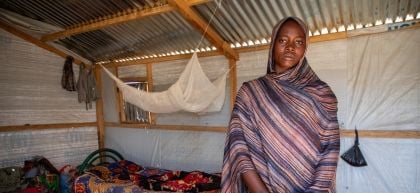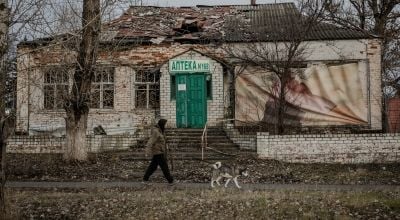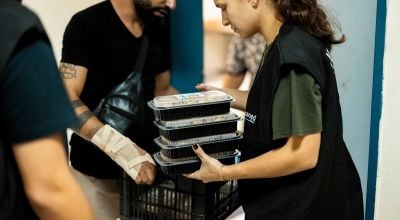
Read our 2023 annual report

Knowledge Hub
Millions of people have fled Sudan due to conflict. Those who have crossed the border are faced with more uncertainty.
Since conflict broke out between rival factions in Sudan on April 15, 2023, a humanitarian crisis has been worsening. 8.1 million people have been displaced from their homes, fleeing fighting in their villages. Food insecurity has risen, with prices of staple grains expected to skyrocket. According to a report from the FAO-WFP, food prices in Sudan were 228% higher in 2023 than the previous two years, with the average cost of a local food basket 88% higher than it was before the conflict. As health systems deteriorate, cases of cholera have increased, and humanitarian assistance faces many obstacles to reach its intended targets.
Out of the 8.1 million Sudanese who have been displaced, 1.8 million of them have crossed the border, the majority of whom have crossed into neighbouring countries. It is estimated that over 540,000 displaced people have crossed into Chad since the beginning of the conflict - over double the amount of people who arrived into Chad fleeing conflict in Darfur in 2003. This is the biggest arrival of refugees and displaced returnees in over 20 years to Chad, a country already dealing with limited resources.
Many of these displaced people arrived with nothing but the clothes on their backs, having been forced to flee violence without their belongings. Many made a dangerous journey to cross the border. Some lost family members and friends along the way; others do not know if their wider family have survived.
Concern Worldwide’s team has been supporting displaced people in Chad with the essential supplies and health and nutrition support needed to survive. Here are some of their stories.
“Some people had been killed. Our brother was among them”
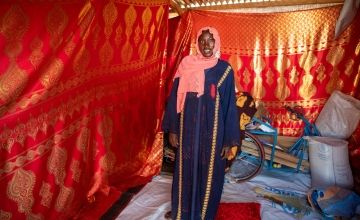
Prior to the conflict, Aichta*, 22, had a regular daily routine. She would clean her home, wash clothes, collect firewood, tend to her crops in the farm, and attend Islamic teaching classes; and was excited to live in the house her husband was building for her. But all of this came to a halt when fighting broke out near her village in West Darfur. Aichta, her parents and her younger brothers decided to make the journey to Chad after hearing the devastating news that her older brother was killed in the conflict in Geneina.
“When we heard about my brother’s death, it was very painful for us. We cried a lot,” Aichta said. “The news was brought to us by his neighbour who lived close to him in Geneina. He had managed to escape Geneina, and he came and told us how some people had been killed and that our brother was among them.”
Aichta and her family knew that the journey was dangerous, and that some people before them had been attacked and even killed on the way. Thankfully, they made it safely to a transit camp at the Chadian border, and later transferred to a refugee camp in Eastern Chad. Aichta found solace in support from Concern and other NGOs at the camp, saying: “We have received soaps, kitchen sets and also sanitary pads. We also received a solar lamp from another NGO which helps us especially at night to light our house.”
When we heard about my brother’s death, it was very painful for us. We cried a lot
However, she still struggles to afford other essential items. “The main challenge here is we don’t have sugar, we don’t have salt and we don’t have soap. We also don’t have the money to go and buy them. If we had the money, we would buy them, but we have so many needs to cater to which makes it hard for us to afford them. We don’t have a variety of meals. There is meat, but it is very expensive. We are only able to eat it once a month.”
Aichta is now four months pregnant, and does not want to return to Sudan, as it is unsafe. She hopes to remain in Chad and be able to educate her child when they are old enough.
“Before the conflict began, our life was really nice”
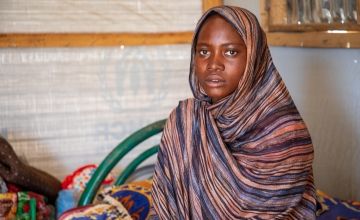
Didja*, 20, lives in a refugee camp in Eastern Chad with her sisters, having been forced to flee her home in Sudan when conflict broke out in the town. Prior to the conflict, Dijda had been studying at university and achieved an income selling produce from her family’s farm.
“Before the conflict began, our life was really nice,” she said. “We did not have any problems and we never lacked. I would also go to visit my friends and some relatives, and we would chat and have a good time and then later in the evening we would return back home to rest.”
However, this all changed when fighting came to her town. Didja and her family were forced to take the difficult journey from Sudan to Chad when their village became unsafe. On the journey, they faced attacks and the few items they had carried with them were destroyed. Tragically, upon arriving in a transit border camp in Chad, Didja learned that four of her relatives had been killed in the conflict.
She explained: “Many people from my family have been killed. I have lost about four people. It was very painful when I heard that my relatives were killed. In my mind, all I could think of was how we would escape from our place because the shooting was becoming too much, and many people were dying. We were just looking for ways of escaping. I did not even think that I would be alive today.”
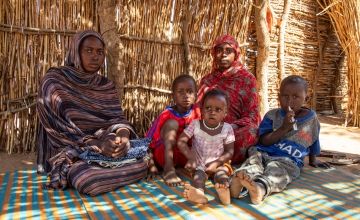
In June, Didja and her sisters moved to a refugee camp in Eastern Chad, where their living conditions improved as they received more humanitarian assistance, including food items like sorghum, beans, rice and oil. Concern provided Didja with essential non-food items, for which she was very grateful. “We have received [from Concern] mats, blankets, buckets, and kitchen sets as well as some bed sheets which we use to cover ourselves when we sleep. When we came here, we only had two cups and we would use them for everything. But thanks to Concern, it has become easier for us to prepare our meals.”
While the situation has improved for Didja, she misses many things about her home. “ Firstly, I miss going to school,” she said. “Here in the camp, there is no school for us adults which means I cannot go to school like I used to in Sudan. Secondly, I don’t have both my parents here. We are scattered in different parts, and I don’t know where they are right now. We don’t want to go back to Sudan because there is no peace and stability. There is no one to protect us back home.”
Despite the instability, Didja still has hopes for a bright future. “I would like to go back to school to study and then to hopefully find some work. I would like to have a job and one day I hope that I will become a doctor.”
“It is very tough for us to stay here”
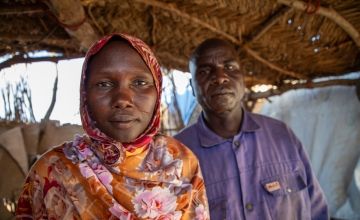
Bahar* and Arafa* have already experienced the turmoil that conflict can bring, when war broke out in Darfur in 2003. They fled their home and ended up living in bushes for three years with their livestock. They returned home after three years, but have again been forced to flee due to conflict erupting last year.
While travelling to Chad, Bahar, 40, made the difficult decision to part ways with Arafa, 30, and their three children halfway, to return home and retrieve their belongings. “I had no choice. It was important for me to go back in order to have something that we could use during our journey,” he said. “I could not stop thinking about them the entire time I was without them.
Arafa recounted the uneasy feeling of watching her husband returning home alone. “When my husband went back to bring our luggage and some food, I could not sleep. I was worried. Was he alive? Had he been killed? I did not have any news as there was no network to call.” She and her children endured scorching heat and a lack of clean water on their journey, but thankfully arrived safely over the border - and were eventually reunited with Bahar.
The family first stayed in a transit camp at the border, but struggled with the limited space and resources, so eventually moved to a refugee camp in Eastern Chad. While they have received aid, food is still an issue for Bahar, Arafa and their kids. “Our biggest challenge here is food,” Bahar explained. “They give us some beans and oil, but we don’t receive things like soap, sugar, and some other essential items that we need.”
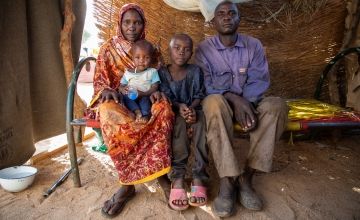
Amidst the struggles, the family was grateful for supplies provided to them by Concern Worldwide. “They gave us mats, blankets, kitchen sets, buckets and jerry cans. Before we received these items, we were just using clothes on the ground to sleep on. We did not have any other choice. When we received the mats, that was the first time we had something to sleep on.”
However, they miss their home, and hope that peace and stability returns to Sudan so they can also return. Bahar said: “We miss our garden a lot. When we were back home, we were able to go to our own field where we had mangoes, guavas, sugar cane and our children could eat them. Since we arrived here, we have nothing. We have no fruits, and we cannot farm. It is very tough for us to stay here. Here, we are given sorghum and beans, but it is not enough. It only lasts for a few days and before we get to a new month where the distribution of food happens, our food is usually already finished. Sometimes our children become sick, and we don’t have enough money to bring them to a hospital. It is not easy. We really miss our home because there we had everything that we needed.”
*Names have been changed for security reasons
Interviews by Eugene Ikua
Concern’s response in Chad
Seventeen years ago, Concern began operations in Chad in response to refugees fleeing conflict in Sudan and now we are back in a similar situation.
Our team is implementing a multi-sectoral emergency response in this camp in Eastern Chad to support households displaced by the conflict in Sudan. The response includes:
- The provision and construction of shelters to protect families who have fled
- A mobile health clinic providing nutrition services for cases of malnutrition, prenatal and postnatal consultations, and vaccination services
- Supporting health centres in the surrounding villages with access to healthcare, medication and staffing of the clinics
- Distribution of NFI kits, including tarpaulins, ground mats, jerry cans, mosquito nets, blankets, buckets, pots and cooking utensils.
You can donate to our work supporting Sudanese refugees in Chad here.
